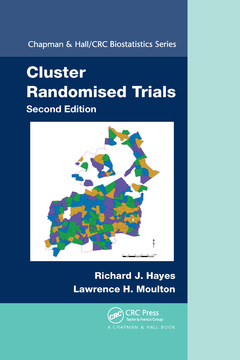Cluster Randomised Trials (2nd Ed.) Chapman & Hall/CRC Biostatistics Series
Auteurs : Hayes Richard J., Moulton Lawrence H.

Cluster Randomised Trials, Second Edition discusses the design, conduct, and analysis of trials that randomise groups of individuals to different treatments. It explores the advantages of cluster randomisation, with special attention given to evaluating the effects of interventions against infectious diseases. Avoiding unnecessary mathematical detail, the book covers basic concepts underlying the use of cluster randomisation, such as direct, indirect, and total effects.
In the time since the publication of the first edition, the use of cluster randomised trials (CRTs) has increased substantially, which is reflected in the updates to this edition. There are greatly expanded sections on randomisation, sample size estimation, and alternative designs, including new material on stepped wedge designs. There is a new section on handling ordinal outcome data, and an appendix with descriptions and/or generating code of the example data sets.
Although the book mainly focuses on medical and public health applications, it shows that the rigorous evidence of intervention effects provided by CRTs has the potential to inform public policy in a wide range of other areas. The book encourages readers to apply the methods to their own trials, reproduce the analyses presented, and explore alternative approaches.
Preface
Authors
Glossary
Part A Basic Concepts
Introduction
Variability between Clusters
Choosing Whether to Randomise by Cluster
Part B Design Issues
Choice of Clusters
Matching and Stratification
Randomisation Procedures
Sample Size
Alternative Study Designs
Part C Analytical Methods
Basic Principles of Analysis
Analysis Based on Cluster-level Summaries
Regression Analysis Based on Individual-level Data
Analysis of Trials with More Complex Designs
Part D Miscellaneous Topics
Ethical Considerations
Data Monitoring
Reporting and InterpretationReferences
Appendix
Richard J. Hayes is affiliated with the Department of Infectious Disease Epidemiology at the London School of Hygiene and Tropical Medicine, UK.
Lawrence H. Moulton is affiliated with the Bloomberg School of Public Health at Johns Hopkins University, USA.
Date de parution : 06-2022
15.6x23.4 cm
Date de parution : 08-2017
15.6x23.4 cm
Thèmes de Cluster Randomised Trials :
Mots-clés :
Treatment Arm; interdisciplinary statistics; STD Treatment; radomized trials; Cluster Randomised Trials; public health; Intracluster Correlation; design issues; Sample Size Calculations; sample size; Cluster Level Summaries; analytical methods; CRT Design; regression methods; HIV Incidence; cluster randomized trial; Project Share; matching; Individual Level Regression; stratification; Cluster Level Analysis; clinical trials; Stepped Wedge Trials; controlled trials; Cluster Level Covariates; Cluster Randomised; Random Effects Logistic Regression Model; Stepped Wedge Design; Cluster Summaries; Control Clusters; Randomised Trials; Interim Analyses; Stratified Trials; Rate Ratio; Regression Model; Wash; Intervention Clusters



